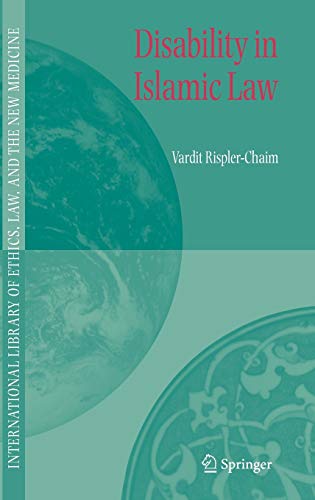Disability in Islamic Law 2007th Edition by Vardit Rispler Chaim ISBN 1402050518 9781402050510 by Vardit Rispler-chaim 9781402050510, 9781402050527, 1402050518, 1402050526 instant download after payment.
Disability in Islamic Law 2007th Edition by Vardit Rispler Chaim - Ebook PDF Instant Download/Delivery: 1402050518, 9781402050510
Full download Disability in Islamic Law 2007th Edition after payment

Product details:
ISBN 10: 1402050518
ISBN 13: 9781402050510
Author: Vardit Rispler Chaim
Disability in Islamic Law 2007th Table of contents:
1 Introduction
- Defining Disability: Contemporary and Islamic Perspectives
- Purpose and Scope of the Study
- Methodology: Islamic Legal Reasoning and Contemporary Disability Studies
- Overview of Chapters
Part I: Conceptual Foundations of Disability in Islamic Law
2 Traditional Understanding of Disability
- Terminology and Definitions in Classical Islamic Texts:
- Terms like maʿdhūr, dhawi al-iʿtiyāqāt, ahl al-ʿahd
- Medical and Social Perceptions of Impairment in historical Islamic societies
- Religious and Ethical Perspectives:
- Divine Will and Predestination (qadar)
- Trial and Reward (ibtilaʾ and ajr)
- Patience (sabr) and Gratitude (shukr)
- The Prophet Muhammad's Teachings and Practices:
- Treatment of individuals with disabilities in the prophetic tradition
- Empathy, compassion, and justice as guiding principles
- The Role of Reason (ʿaql) and Capacity (ahliyya)
- Legal implications of mental and physical capacity
- Differentiating between various types of disability
3 Rights and Duties of Persons with Disabilities
- General Human Rights in Islam: Dignity (karama) and Equality
- Specific Rights Related to Disability:
- Right to Life and Protection: Protection from harm, neglect, and abuse
- Right to Education: Access to knowledge and learning
- Right to Work and Livelihood: Economic independence and participation
- Right to Marriage and Family Life: Eligibility for marriage, divorce, and parenthood
- Right to Justice and Legal Protection: Equal access to courts, testimony
- Right to Social Inclusion: Participation in community life, mosque attendance, pilgrimage
- Exemptions from Religious Duties:
- Prayer (salat), Fasting (sawm), Hajj (pilgrimage), Jihad (struggle)
- Interpretations of capacity and hardship (rukhsa)
Part II: Specific Categories of Disability and Legal Rulings
4 Physical Disabilities
- Locomotor Disabilities:
- Mobility impairments and their implications for religious rites (prayer, Hajj)
- Legal rulings on travel, presence in congregational prayers
- Sensory Impairments:
- Blindness: Legal capacity, testimony, leadership roles, marriage
- Deafness: Communication, legal capacity, rights in marriage
- Speech Impairments:
- Implications for legal contracts, testimony, reciting Quran
- Use of sign language or written communication
5 Mental and Intellectual Disabilities
- Defining Mental Incapacity (junūn, ʿatah) in Islamic Law:
- Differentiation between transient and permanent conditions
- Legal Implications of Mental Disability:
- Competency for contracts (marriage, sale, finance)
- Criminal and Civil Liability
- Guardianship (wilaya) and Custodianship (qayyima)
- Ethical Considerations in Treatment:
- Best interests of the individual
- The role of the family and community
6 Chronic Illnesses and Health Impairments
- Disabilities Arising from Chronic Diseases:
- Implications for religious duties (e.g., chronic illness and fasting, prayer)
- End-of-Life care and decision-making
- Invisible Disabilities:
- Chronic pain, mental health conditions (depression, anxiety)
- Recognition and support
Part III: Contemporary Issues and Future Directions
7 Bioethics, Genetics, and Disability
- Genetic Testing and Counseling: Islamic perspectives on prenatal diagnosis
- Disability Prevention vs. Disability Rights: Ethical dilemmas
- Reproductive Technologies and Disability: Implications for individuals with disabilities
- Gene Therapy and Enhancement: Islamic views
8 Accessibility, Inclusion, and Social Justice
- Physical Accessibility in Mosques and Public Spaces: Contemporary efforts
- Inclusive Education: Strategies and challenges in Islamic contexts
- Employment Opportunities: Breaking down barriers
- The Role of Islamic Organizations and NGOs: Advocacy and support for persons with disabilities
- Challenging Stereotypes and Promoting Positive Attitudes
9 Disability Rights in Contemporary Muslim Societies
- Review of National Laws and Policies: Comparison with international standards (UN CRPD)
- Cultural and Social Barriers: Traditional beliefs and practices that hinder inclusion
- Activism and Advocacy: Voices of persons with disabilities in Muslim communities
- The Way Forward: Towards a More Inclusive Islamic Praxis
People also search for Disability in Islamic Law 2007th:
disability in islamic law
disability rights in saudi arabia
disability insurance in islam
disabled in islam
disability insurance halal
Tags: Vardit Rispler Chaim, Disability, Islamic



